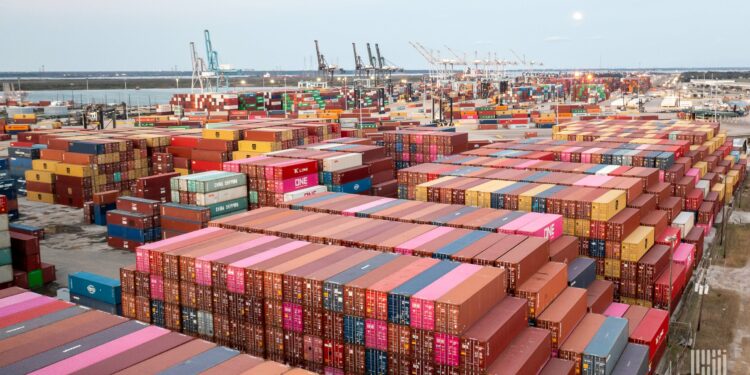Trade and tariff concerns are roiling an already volatile market and pushing up prices for shipping containers in North America, a new report says.
The region saw a 20% spike in average container prices over the past 90 days to lead a global surge on market volatility, U.S. election uncertainty and tariff fears, growing Mexico-U.S. trade, and logistical disruptions in Canada, according to the December forecast from box marketplace Container xChange.
Higher container prices — and freight rates — are projected to remain higher.
“Tariffs make trade less efficient by adding costs, time, and complexity,” said Christian Roeloffs, co-founder and CEO of Container xChange, in the report. “For instance, instead of straightforward routes, businesses may rely on transshipments, rerouting through Mexico, or diversifying production and assembly sites. This inefficiency requires additional capacity, much like what we saw during Red Sea diversions.
“Consequently, we anticipate container prices and freight rates to stay elevated, supporting demand for containers and vessel capacity. However, retaliatory tariffs and inflationary pressures will likely harm US exports more than imports, creating broader imbalances in trade dynamics.”
Since 2023, Houthi militia based in Yemen have attacked Red Sea shipping it claims are connected to Israel. Major ocean lines linking Asia, the Mediterranean and the East Coast of the United States have detoured away from the Red Sea and Suez Canal around the Horn of Africa, adding 10-14 days and higher operational costs to a typical voyage. It is unclear how the fall of Bashar al-Assad’s regime in Syria may affect the situation, but Gaza-based Hamas over the weekend called on Palestinians in the West Bank to expand its war against Israel and its allies.
Potential higher tariffs promised by President-elect Donald Trump, the report said, will further accelerate the ongoing process of trade risk diversification, which began during the COVID-19 pandemic. While this could create opportunities for new trade routes, it may also lead to a temporary mismatch in container supply and demand.
Container xChange found the North America region saw the largest increase in average container prices, with 40-foot high-cube cargo-worthy container prices rising by 20% over the past 90 days. North America was the most volatile market in that time, followed by East Africa and Southeast Asia.
The biggest spike came at Long Beach, California, where average container prices rose from $2,594 in October to $3,400 in November, a 31% increase representing a tightened market for container trading in the U.S.
The report described as “noteworthy” that the average container price across Canada rose by 23.3% from $2,086 in May to $2,570 in November. “This indicates a rebound in container prices in the latter half of 2024, driven by increased demand and supply chain pressures. Prices saw the largest percentage increase of 26.8% between May, $1,929, and November, $2,446,” the report stated.
Canada in that time suffered supply chain disruptions due to labor conflicts with unionized rail and port workers.
Conversely, China registered no change in average container prices from October to December. The port centers of Shanghai and Ningbo registered 5% and 2% spikes, respectively, but prices fell at Dalian, Shenzhen and Xiamen.
“While structural challenges like stagflation and persistent geopolitical tensions weigh heavily on the outlook for 2025, there is potential for persistent holding up of container shipping price flare-ups,” Roeloffs said. “Success will hinge on businesses staying agile, leveraging data, and preparing for both likely and unforeseen scenarios.”
In the outlook for 2025, the report said positive factors likely include a lowering of interest rates that will lead to lower container prices in the U.S. and Europe. Less likely was increased trade demand from a resolution to the war between Russia and Ukraine.
A likely negative factor is shipping overcapacity driving down freight rates and container prices. Unlikely: stagflation combining slower growth with higher inflation.
The report outlined developments that are expected to affect container logistics in 2025.
Geopolitical tensions, trade disruptions and Trump tariffs will exacerbate market volatility, giving rise to intra-Asia trade and similar newer, smaller, more localized routes. Transshipment hubs will emerge in Southeast Asia and the Middle East, offering a decentralized model that is more flexible and resilient in key shipping lanes.
Increasing trade tensions will reshape trade routes, such as China-Mexico-U.S. that are already growing for trans-Pacific commerce. Traders will have more options and reduced reliance on a single trade path as tariffs and sanctions impact costs and flow dynamics.
Increased operational costs from fuel prices, regulatory compliance and trade tariffs magnified by geopolitical issues, environmental regulations and disruptions will directly affect container traders, influencing shipping rates and operational planning.
Fleet expansion by liner operators is expected to continue, as carriers align with fluctuating demand and adapt to stricter environmental regulations. Investments now focus on more efficient, environmentally friendly vessels to meet new emissions standards while managing growing trade volumes.
Volatility will also lead container traders to prioritize flexibility with improved visibility across the supply chain. Real-time tracking and predictive analytics will help mitigate risks and speed more informed decisions.
The report said trade patterns will continue to evolve, with accompanying shifts in the volume of goods moving through certain regions due to tariffs, labor disputes, climate-related disruptions and other factors. Traders will have to adapt rapidly to changing conditions amid freight rate volatility.
Find more articles by Stuart Chirls here.
Related coverage:
Shippers urge longshore union, employers to resume contract talks
Slaying of UnitedHealthcare CEO puts focus on executive protection
Predictions platform says longshore strike not a sure bet
Source link : http://www.bing.com/news/apiclick.aspx?ref=FexRss&aid=&tid=67573bd4aece4da199dabcc707079289&url=https%3A%2F%2Fwww.freightwaves.com%2Fnews%2Ftariff-threats-roil-north-american-container-marketplace&c=9844593362881115744&mkt=en-us
Author :
Publish date : 2024-12-09 05:27:00
Copyright for syndicated content belongs to the linked Source.








